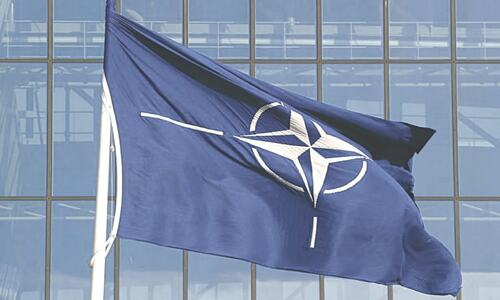HARARE: The Zimbabwean government said Saturday’s visit by South African President Thabo Mbeki was a “milestone” in the power-sharing negotiations he is mediating between President Robert Mugabe’s party and the opposition.
The South African government announced a day earlier that Mbeki was flying to Harare Saturday for meetings with Mugabe, main opposition leader Morgan Tsvangirai and Arthur Mutambara, leader of a smaller opposition faction. Mbeki was to return to South Africa on Sunday.
Mbeki “is going to meet the principals, basically to update them on the progress so far and to consult on how to take the dialogue forward”, Mugabe’s spokesman George Charamba said, according to Zimbabwe’s state-run Herald newspaper.
“This is an important milestone that has been registered in the interparty dialogue,” Charamba was quoted as saying, without elaborating.
The Herald said negotiators of Mugabe’s party and the opposition returned from South Africa, where the talks began, after a memorandum of understanding was signed July 21 setting out a framework for meetings between Mugabe’s ZANU-PF, Tsvangirai’s Movement for Democratic Change and Mutambara’s faction of the Movement for Democratic Change.
South African mediators have said the goal of the talks is some kind of power-sharing deal to tackle the nation’s deepening political and economic crisis.
Bitter rivals Mugabe and Tsvangirai met face-to-face for the first time in a decade at the Harare signing on July 21.
Mbeki has imposed a news blackout on the ongoing talks, which have involved top deputies of the party leaders and been held at an undisclosed location in the South African capital. The blackout has made it difficult to determine whether Mbeki is making any progress in easing the political standoff.The sticking points appear to be the questions of who would lead a unity government and whether Mugabe would have any role.
Both Mugabe and Tsvangirai claim to be Zimbabwe’s legitimate leader Tsvangirai based on placing first in a field of four in March presidential elections; Mugabe based on a widely denounced June runoff in which he was the only candidate.
Tsvangirai, who did not win the March vote by the margin necessary to avoid a second round, withdrew from the runoff because of attacks on his supporters blamed on Mugabe’s party militants and security forces. Tsvangirai has said that while he could work with ZANU-PF moderates, he will not share power with Mugabe.
The talks broke down July 28, with officials saying the problem was Mugabe’s insistence that he be the president of any new government. But talks resumed on Sunday, and there was an indication on Wednesday that both sides were determined to work together toward a solution: the Movement for Democratic Change and ZANU-PF issued their first joint communique condemning violence.
Mbeki is under pressure to show results before a summit he is to host at mid-month of the Southern African Development Community, or SADC, the body that appointed him to find a solution to a crisis that is undermining regional security.
Zimbabwe’s economic meltdown has added urgency to finding a settlement.—AP















































